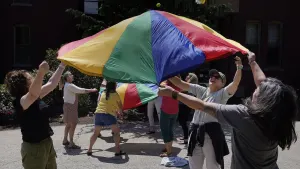More Stories
This morning, News 12's Elizabeth Hashagen was joined Dr. Daniel Griffin, the chief of the Division of Infectious Disease at Pro Health, to discuss the impact of the Omicron subvariants that continue to sweep across the tri-state and a second booster shot for adults.
With COVID-19 cases climbing again, doctors say this Omicron subvariant can hide from tests and easily reinfect people. Right now, six counties in New Jersey are considered high risk. All five New York boroughs are back in the Center for Disease Control and Prevention's high-risk category for community COVID spread, with Nassau and Suffolk counties on that list as well. Dr. Daniel Griffin weighs in what we should know about this variant:
As of right now, the second booster is only authorized for those who are at least 50 years old or for those who are immunocompromised. The Food and Drug Administration is working to change that, as fears grow that young peoples' protections are dwindling. How safe are people who are already vaccinated and boosted compared to those who are not?
A virus undergoes immune enhancement when a person's immune system, after initial exposure to the pathogen, backfires during reinfection. What happens to someone who is reinfected with the Omicron variant, and how does this pertain to their immune enhancement?
Masks are once again being urged in New York City, as cases of the COVID-19 Omicron subvariant BA.5 tick up. The New York City Health Department and the CDC are urging residents to wear masks in all indoor settings and crowded areas outdoors. Since mandates are gone, likely forever in most of the United States, most people have ditched their masks and are unlikely to put them back on. How should people think about their risk from COVID-19 right now?
The White House is aiming to make second booster doses available for all adults by the fall. How important is the fourth shot?
In conclusion, what does the future of COVID-19 vaccines look like?
More from News 12
1:28

5 simple steps for long-term benefits to your health and heart
1:32

8 tips for working safely during hot weather
3:31

Guide: Ways to set your child up for financial success
3:18

Guide: The importance of good sleep and how to get it

Guide: Mental health resources available in the tri-state
9:36
